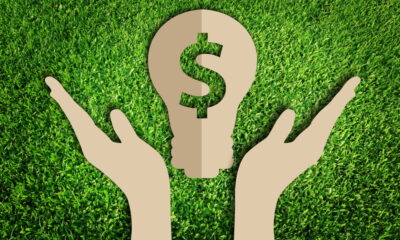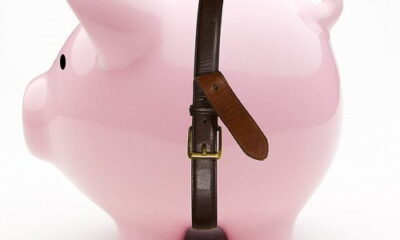

Economy
Expert Approved Eco-Friendly Financial Options To Get On Track
You might think that it would be difficult to live an eco-friendly lifestyle and stay financially fit at the same time. However, the truth is that there are a lot of ways to be frugal and live a green lifestyle. In fact, since green living tends to revolve around minimalism, embracing eco-friendly lifestyles could be a good way to get your financial house in order.
If you have problems with your credit, then there are a lot of green living strategies that can help get you back on the right track. Green America has some guidance on finding eco-friendly financial consultants. However, you can embrace green living on your own to be more frugal and improve your financial problems.
Eco-Friendly Ideas to Fix Your Financial Problems
Applying for a loan is an effective means for every individual who desires to extend their finances, fund their business, or purchase a new car or even a new home. Getting a loan for whatever purposes goes through the same process of screening and application. Even people living a sustainable lifestyle might need a loan once in a while. However, not all interested applicants get approved. The denial rate for personal loan applicants was around 36% before the pandemic, but it might be even higher today.
The most common reason why some borrowers fail is the stringent credit qualification. Fortunately, it is possible to improve your score while living an eco-friendly lifestyle at the same time.
But what does your score mean? And why is it important when it comes to getting your loan approval? How do you fix it when you have a poor score, without compromising your commitment to sustainable living? Let’s hear what financial experts say and their advice on what you can do to rebuild your credit.
Use Eco-Friendly Credit Cards
There are a lot of eco-friendly credit cards that you can look into using. You might want to consider researching them. In addition to helping you reduce your carbon footprint, these cards often have lower interest rates, which makes it easier to pay them off.
Three-Digit Number Lifeline
A credit score is composed of three-digits that are crucial to be qualified for different types of installment loans. Whether you are applying for a mortgage, a car loan, or a credit card, your score is what every lender will look into first. This is the most critical requirement for every interested borrower.
The primary thing every borrower should remember is that the higher your score, the better benefits you’ll get when you apply for any loan type. Higher scores get you to better loan terms and rates, while poor and bad scores are undesirable. Poor to bad score makes you a high-risk borrower for any lenders, which can result in either getting your application rejected or being subjected to high-interest rates.
You can improve your credit by living a greener lifestyle, which entails reducing consumption. This will make it easier to pay off your old debts to improve your score.
Reasons For A Poor Score
You must know what makes up a poor score and how you end up having one. This is to make sure that you understand its importance and why you shouldn’t take it for granted. There are only a few yet common reasons why borrowers end up having a poor score, which are:
- Not paying the loan amount at all.
- Delayed and missed repayment schedules.
- A credit account is being charged off or defaulting a loan.
- A credit account is sent to a collection agency.
- Maxed out credit cards.
There are still a few other reasons why you get a poor or bad score. Beware in doing these if you don’t want to hurt your score even further.
Take It From The Experts
Now that you know the reasons that might have a low score, it is now the time for you to learn how to fix and avoid it.
Pay your bills on time; better have it automated.
According to Tiffany Aliche, a personal financial expert of The Budgetnista, raising your score doesn’t happen overnight. It might take at least a month or two, depending on the reason for your score’s current state. A good way to keep up with your loans and avoid missing any repayments that highly constitute having a poor score is automating your payment.
Set it and semi-forget it, as what Aliche says. Setting up an automated payment schedule is an effective way to make sure you pay your dues on time. Paying on time has a lot to do in rebuilding your score.
Pay off accounts on collection.
Sometimes, it cannot be helped if your lender sends your accounts to a collection agency, especially if you are nowhere near to settle your dues. As per Jeff Richardson, the vice-president of VantageScore, if you have the means to act on your account in a collection agency, do it. No matter what age it is and the amount, make sure to pay it off in full amount. This will ultimately help you in regaining your score.
Check your credit report.
As a borrower, it is your sole responsibility to check your credit report, may it be annually or quarterly, if you are active in applying for a loan. This way, you will know if there are discrepancies with the report, such as erroneous and outdated data, or missing records. Sometimes, what constitutes your poor score are human errors that we can’t easily deny. Did you know that there are at least 25% of credit reports that contain errors severe enough to affect your score? Make sure to check your credit reports and see to it that the information stated is accurate. If possible, do it even if you’re not planning to take out a loan.
Green Living Can Improve Your Credit
There are many great reasons to follow a sustainable lifestyle. You might not have realized that green living can help boost your credit, but it can. Rebuilding your score does not happen overnight, and it isn’t quickly repaired with one on-time repayment. It takes hard work and dedication if you want to boost and improve your finances. It requires consistency in meeting your repayment schedule and diligence in checking your reports. These might seem like they are easy things to do, but it takes time and effort. Getting a loan is a responsibility, and you should stick with it if you don’t want to be troubled in fixing financial problems.
































